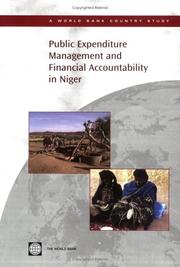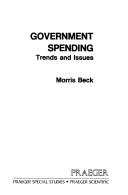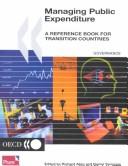| Listing 1 - 10 of 95 | << page >> |
Sort by
|
Book
ISBN: 1498349625 Year: 2016 Publisher: [Place of publication not identified] : International Monetary Fund,
Abstract | Keywords | Export | Availability | Bookmark
 Loading...
Loading...Choose an application
- Reference Manager
- EndNote
- RefWorks (Direct export to RefWorks)
Expenditures, Public --- Appropriations and expenditures --- Government appropriations --- Government expenditures --- Government spending --- Public expenditures --- Public spending --- Spending, Government --- Finance, Public --- Public administration --- Government spending policy --- Econometric models.
Book
ISBN: 1513509284 Year: 2019 Publisher: Washington, District of Columbia : International Monetary Fund,
Abstract | Keywords | Export | Availability | Bookmark
 Loading...
Loading...Choose an application
- Reference Manager
- EndNote
- RefWorks (Direct export to RefWorks)
Expenditures, Public. --- Appropriations and expenditures --- Government appropriations --- Government expenditures --- Government spending --- Public expenditures --- Public spending --- Spending, Government --- Finance, Public --- Public administration --- Government spending policy

ISBN: 0821355996 9786610084173 1280084170 0585479542 Year: 2004 Publisher: Washington, DC : World Bank,
Abstract | Keywords | Export | Availability | Bookmark
 Loading...
Loading...Choose an application
- Reference Manager
- EndNote
- RefWorks (Direct export to RefWorks)
Public finance --- Developing countries --- Finance, Public. --- Expenditures, Public. --- Appropriations and expenditures --- Government appropriations --- Government expenditures --- Government spending --- Public expenditures --- Public spending --- Spending, Government --- Finance, Public --- Public administration --- Government spending policy --- Cameralistics --- Currency question --- Public finances
Book
ISBN: 0821357522 9786610085668 1417539976 1280085665 0821383736 1417539976 Year: 2004 Publisher: Washington, DC : World Bank,
Abstract | Keywords | Export | Availability | Bookmark
 Loading...
Loading...Choose an application
- Reference Manager
- EndNote
- RefWorks (Direct export to RefWorks)
A companion to the Customs Modernization Handbook, this book provides case studies on customs modernization initiatives in seven countries (Bolivia, Morocco, Mozambique, Peru, the Philippines, Turkey, and Uganda). The initiatives in each of these countries show similarities as well differences in their approach and design. Some have relied on a model of Independent revenue authorities (Uganda and Peru), others have called upon private sector service providers to initiate the modernization process (Mozambique), others have taken the drastic step of a complete overhaul of their customs staff (Bo
Foreign trade policy --- Developing countries --- Customs administration --- Expenditures, Public --- Appropriations and expenditures --- Government appropriations --- Government expenditures --- Government spending --- Public expenditures --- Public spending --- Spending, Government --- Finance, Public --- Public administration --- Government spending policy --- Tariff

ISBN: 0821363662 0821363670 9780821363669 9786610240005 1280240008 Year: 2005 Publisher: Washington, D.C. : World Bank,
Abstract | Keywords | Export | Availability | Bookmark
 Loading...
Loading...Choose an application
- Reference Manager
- EndNote
- RefWorks (Direct export to RefWorks)
Effective, efficient and transparent management of public resources is particularly important in a poor country like Niger. This study shows how difficult it is for Niger to significantly change its expenditure composition in a short time span. A narrow and volatile domestic resource base, heavy dependence on aid, and a large share of pre-determined expenditures such as external debt payments are important factors behind this lack of flexibility. There are ways, though, to create space in the budget for increasing public spending on priority sectors. The study identifies a number of measures i
Public finance --- Public expenditure --- Niger --- Expenditures, Public --- Finance, Public --- Accounting. --- Appropriations and expenditures --- Government appropriations --- Government expenditures --- Government spending --- Public expenditures --- Public spending --- Spending, Government --- Public administration --- Government spending policy --- Cameralistics --- Public finances --- Currency question
Book
ISBN: 9264076131 9264144765 Year: 1995 Publisher: Paris : OCDE (Organisation de coopération et de développement économiques) = OECD (Organisation for Economic Co-operation and Development),
Abstract | Keywords | Export | Availability | Bookmark
 Loading...
Loading...Choose an application
- Reference Manager
- EndNote
- RefWorks (Direct export to RefWorks)
Effective systems for allocating, managing and controlling public sector resources are fundamental elements of good governance. The need for continuing fiscal restraint and demands for more and better public services are changing budgetary practices in OECD countries. Budgets are being used increasingly as instruments for promoting managerial improvement and programme effectiveness, in addition to their control and allocation functions. This report analyses budget practices and innovations in twenty-two OECD countries. It describes how the practice of budgeting is contributing to a greater performance orientation in the public sector. It also provides standard summaries of the institutional framework and procedures governing budgeting in each of these countries.
Governance --- Budget --- Expenditures, Public --- Political Science --- Law, Politics & Government --- Public Finance --- Appropriations and expenditures --- Government appropriations --- Government expenditures --- Government spending --- Public expenditures --- Public spending --- Spending, Government --- Budgeting --- Finance, Public --- Public administration --- Government spending policy --- Forecasting --- Public finance --- Public economics --- PUBLIC EXPENDITURE --- GOVERNMENT BUDGETS --- MONITORING AND CONTROL

ISBN: 0030586291 Year: 1981 Publisher: New York : Praeger,
Abstract | Keywords | Export | Availability | Bookmark
 Loading...
Loading...Choose an application
- Reference Manager
- EndNote
- RefWorks (Direct export to RefWorks)
Public expenditure --- Expenditures, Public --- Dépenses publiques --- United States --- Appropriations and expenditures --- depenses publiques --- royaume uni --- overheidsuitgaven --- verenigd koninkrijk --- Dépenses publiques --- Government appropriations --- Government expenditures --- Government spending --- Public expenditures --- Public spending --- Spending, Government --- Finance, Public --- Public administration --- Government spending policy --- Appropriations and expenditures. --- Amérique du nord --- États-Unis --- Depenses --- Pouvoirs publics --- Reste du monde --- Statistique

ISBN: 1280034882 9786610034888 9264192603 9264186530 Year: 2001 Publisher: Paris : OECD Publishing,
Abstract | Keywords | Export | Availability | Bookmark
 Loading...
Loading...Choose an application
- Reference Manager
- EndNote
- RefWorks (Direct export to RefWorks)
Managing Public Expenditure presents a comprehensive and in-depth analysis of all aspects of public expenditure management from the preparation of the budget to the execution, control and audit stages. The book will be of general interest but is focused particularly on the needs of countries in transition, especially those in Central and Eastern Europe that seek to become members of the European Union. The book provides practical, operational information and guidance on all areas of public expenditure management, e.g. legal and institutional frameworks, preparation of the budget, implementation, cash management, performance management, accounting, financial information and reporting systems, internal control and internal audit, and external audit. Each part of the book ends with key points and directions for reform. The detailed questionnaire will help practitioners to identify the strong and weak elements in their budget systems so that they can take necessary remedial action. Managing Public Expenditure ends with a comprehensive glossary, bibliography and index. Richard Allen is an economist and spent most of his career at HM Treasury (the British Ministry of Finance), working mainly in the areas of fiscal policy, EU affairs, public expenditure management and international finance. He has also served as a diplomat in Washington DC and as a board member of the European Investment Bank. He was head of the budget and resource allocation team of the SIGMA Programme and is now adviser on governance at the Asian Development Bank. Daniel Tommasi is a Paris-based consultant in the the areas of fiscal policy, public expenditure management and macroeconomic management. He is an adviser to governments and a consultant for international organisations, including the World Bank, the Asian Development Bank, the United Nations Development Programme, and the European Union's Phare and Tacis Programmes. He has worked for over 25 years in some 30 countries in Central and Eastern Europe, the Middle East, Asia, the Pacific and Africa.
Budget -- Europe, Central. --- Budget. --- Expenditures, Public -- Europe, Central. --- Expenditures, Public. --- Finance, Public -- Europe, Central. --- Finance, Public. --- Expenditures, Public --- Finance, Public --- Budget --- Political Science --- Law, Politics & Government --- Public Finance --- Budgeting --- Cameralistics --- Public finance --- Appropriations and expenditures --- Government appropriations --- Government expenditures --- Government spending --- Public expenditures --- Public spending --- Spending, Government --- Currency question --- Public administration --- Government spending policy --- Forecasting --- Public finances --- Dépenses publiques --- Finances publiques
Book
ISBN: 0669017302 9780669017304 Year: 1978 Publisher: Lexington D.C. Heath And Company
Abstract | Keywords | Export | Availability | Bookmark
 Loading...
Loading...Choose an application
- Reference Manager
- EndNote
- RefWorks (Direct export to RefWorks)
Zero-base budgeting --- Expenditures, Public --- Evaluation --- zero base budgeting --- Zero-base budgeting. --- Evaluation. --- Zero budgeting --- Budget --- Budget in business --- Sunset reviews of government programs --- Appropriations and expenditures --- Government appropriations --- Government expenditures --- Government spending --- Public expenditures --- Public spending --- Spending, Government --- Finance, Public --- Public administration --- Government spending policy --- Expenditures, Public - Evaluation
Book
ISBN: 1282553917 9786612553912 9264076905 9264076891 Year: 2010 Publisher: Paris : OECD Publishing,
Abstract | Keywords | Export | Availability | Bookmark
 Loading...
Loading...Choose an application
- Reference Manager
- EndNote
- RefWorks (Direct export to RefWorks)
In all OECD countries, governments collect revenues through taxes and redistribute this public money, often by obligatory spending on social programmes such as education or health care. Their tax systems usually include “tax expenditures” – provisions that allow certain groups of people, such as small businessmen, retired people or working mothers, or those who have undertaken certain activities, such as charitable donations, to pay less in taxes. The use of tax expenditures by governments is pervasive and growing. At a time when many government budgets are threatened by population ageing and adverse cyclical developments, there is a pressing need to avoid inefficient government programmes, some of which may utilise tax expenditures. This book sheds light on the use of tax expenditures, mainly through a study of ten OECD countries: Canada, France, Germany, Japan, Korea, Netherlands, Spain, Sweden, the United Kingdom and the United States. This book will help government officials and the public better understand some of the technical and policy issues behind the use of tax expenditures. It highlights key trends and successful practices, and addresses a broad range of government finance issues, including tax policy making, tax and budget efficiency, fiscal responsibility and rule making.
Impuestos -- Países de la OECD. --- Tax expenditures -- OECD countries. --- Tax expenditures --- Political Science --- Public Finance --- Law, Politics & Government --- Expenditures, Public --- Appropriations and expenditures --- Government appropriations --- Government expenditures --- Government spending --- Public expenditures --- Public spending --- Spending, Government --- Tax preferences --- Tax subsidies --- Finance, Public --- Public administration --- Government spending policy --- Tax incentives --- Taxation
| Listing 1 - 10 of 95 | << page >> |
Sort by
|

 Search
Search Feedback
Feedback About
About Help
Help News
News